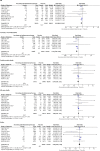Safety and efficacy of anti-inflammatory therapy in patients with coronary artery disease: a systematic review and meta-analysis
- PMID: 35246052
- PMCID: PMC8896203
- DOI: 10.1186/s12872-022-02525-9
Safety and efficacy of anti-inflammatory therapy in patients with coronary artery disease: a systematic review and meta-analysis
Abstract
Background: The inflammation hypothesis of atherosclerosis has been put forward for more than 20 years. Although many animal experiments have suggested that anti-inflammatory therapy can inhibit the atherosclerotic process, the efficacy of anti-inflammatory therapy for patients with coronary artery disease (CAD) is still controversial. Therefore, this study aims to evaluate the safety and efficacy of anti-inflammatory drugs in patients with CAD.
Method: We conducted this systematic review and meta-analysis of randomized controlled trials by searching PubMed, EMBASE, web of science, and Cochrane Library database. The primary outcome was a composite outcome of cardiovascular death, myocardial infarction (MI), or stroke. The secondary outcomes included individual MI, coronary revascularization, cardiovascular death, all-cause death, and stroke. The relative risk (RR) and 95% confidence intervals (CI) for outcome events were calculated by the fixed effects model, and trial sequential analysis was applied to assess the results.
Result: A total of ten randomized controlled trials and 60,782 patients with CAD was included. Compared with patients receiving placebo, anti-inflammatory therapy significantly reduced the incidence of the primary outcome in patients with CAD (RR 0.93, 0.89-0.98, P = 0.007). In addition, the anti-inflammatory therapy can also reduce the risk of MI (RR 0.90, 0.84-0.96, P = 0.002) and coronary revascularization (RR 0.74, 0.66-0.84, P < 0.00001) remarkably. However, there was no significant difference in the incidence of cardiovascular death (RR 0.94, 0.86-1.02, P = 0.14), all-cause death (RR 1.00, 0.94-1.07, P = 0.98) and stroke (RR 0.96, 0.85-1.09, P = 0.51) between two groups.
Conclusions: Anti-inflammatory therapy can reduce the incidence of the primary outcome in patients with CAD, especially the risk of MI and coronary revascularization. However, anti-inflammatory therapy increases the risk of infection. (Registered by PROSPERO, CRD 420212291032).
Keywords: Anti-inflammatory therapy; Coronary artery disease; Meta-analysis.
© 2022. The Author(s).
Conflict of interest statement
The authors declare that there are no competing inter ests regarding the publication of this article.
Figures






References
Publication types
MeSH terms
Substances
LinkOut - more resources
Full Text Sources
Medical
Miscellaneous

